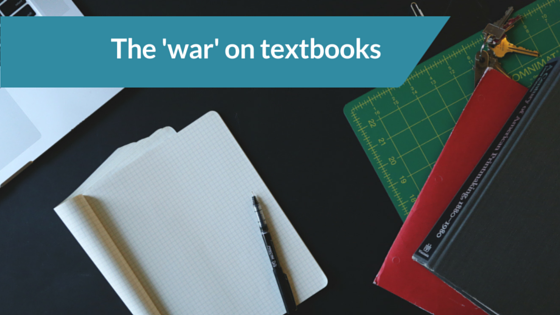Last year, I solemnly vowed that I wasn’t going to use textbooks in my maths lessons. I started the year with a variety of card sorts and problem-solving activities. I even arranged my tables in groups rather than rows from the word go to encourage collaboration. The first few weeks went well, but by half term I was exhausted and the novelty of Tarsia puzzles and Standards matching cards was wearing off for the pupils.
I spent the second half-term really unwell – I ruptured my eardrum and went deaf for a week and a half, then spent three weeks with the most painful sinuses I’ve ever experienced. I dragged myself to the Christmas holidays in a very sorry state. I don’t think this was anything to do with the brave new classroom I was foolishly attempting to create, but I realised that if I wanted to remain functional enough to be in school, I’d have to be a little “easier” on myself in terms of lesson planning.
I really felt a little guilty getting the textbooks back out of the cupboard in November, because I feel like “textbook” is a dirty word in mathematics teaching for some people. There’s an implicit idea that a teacher who uses a textbook is somehow lazier or less pedagogically secure than a teacher who doesn’t, and I guess this is why I went off half-cocked on my “textbook ban”.
Over the last twelve months, though, something has shifted in my mind with regards to my teaching practice. Maybe it’s ever-increasing experience, or maybe it’s because I’ve played around with so many different ideas and pedagogical theories, but I’m now much more comfortable in doing what I know works for me and the pupils in front of me. I quickly realised that my idea of working purely with physical resources and no textbooks wasn’t something that I thought was a good idea, it was what I thought I should be doing – I’m not sure where I got this notion from, as we don’t have any kind of policy in our school about the use or otherwise of textbooks.
The school I worked at in my NQT year didn’t have class sets of textbooks; this was both freeing and really, really scary, as I spent a lot of time sourcing resources from elsewhere. While I felt like it challenged me to look for other options than a textbook (I discovered a dusty set of cuisenaire rods in the storeroom and had a lot of fun with them), our photocopying budget was astronomical. As a department, we spent a lot of time doing the old-fashioned cut-and-stick to splice together worksheets from a variety of old books and sources** – this had the advantage of creating a worksheet that did exactly what we wanted for that lesson, but meant that each lesson took an extra 15 minutes to resource.
At one point in the year, someone suggested getting round this problem by printing booklets of 10 Ticks worksheets by level and hard-binding them…
Even in the “textbook ban” lessons last year, pupils still worked on problems in their books. I’d get them to record their working and answers for the Tarsia puzzles we were doing, and I’d still put problems or questions on the board for them to do. After I ditched the stupid idea that every lesson could be a card sort, I went back to carefully selected worksheets and (as the year went on) picked problems out of the textbook.
I suppose that’s the real problem with textbooks – they never do exactly what you want them to. We may as well bin the “teaching” and “examples” steps in them – I’m yet to see a decent UK GCSE textbook that pupils could actually use to teach themselves maths with any depth of understanding. In fact, if we ripped all those bits out, it would make the flipping things much easier to carry around and give out!
What I really want out of a textbook (and I haven’t found it yet) is a set of practice exercises that are chosen and written really really super-carefully. Some textbooks are completely illogical, with thirty easy problems, then a few “hard” ones at the end, which have usually been made more difficult by putting negatives or fractions in, rather than by actually increasing the difficulty or level of thought into the topic actually being learned.
The reason all this waffle happened today is because I had a major faff trying to source some suitable adding fractions questions for my Year 9s. We’ve been working with bar modelling, and spent nearly a week playing with Which is bigger, so I wanted ones with sensible denominators. I also wanted to avoid them using “THE METHOD” to get a common denominator, namely multiplying the two denominators given, and actually engage their brains to think if there was a smaller common denominator first. Both sets of GCSE textbooks, even the Foundation book, gave two worked examples using the cross-multiply method, then within two questions pupils were expected to work with a common denominator of 24, which is all well and good for those who can work with equivalent fractions, but awful for the ones who can only do it using a bar at the moment.
Luckily, I found this great set of problems on Median.

See, now this is what I’m talking about! Sensible denominators, with most one as a simple multiple of the other – encouraging pupils to pick a sensible LCD rather than cross-multiplying (those who didn’t had a lot of cancelling down to do).
I really like how improper fractions crop up as early as question 4 – they shouldn’t be treated as somehow “more difficult” just because the fraction happens to have a total over one whole.
I guess if there’s any conclusion to this piece of brain dumping, it’s that UK textbooks need to be better. We replaced ours a few years ago, and I wasn’t hugely impressed with what was out there – it always feels like selecting an “it’ll do” rather than “oh wow this will really improve my classroom practice”.
The second part of the conclusion is that, even in their not-perfect form, there’s still room for a textbook in the maths classroom. Some exercises are great. Some are passable if you carefully select questions. Sometimes you need to remember that book A is brilliant for topic B, but you may as well ignore it for topic C.
This year’s policy is a healthy mix – we’ve done problems together, worked examples, worksheets, problem-solving, different approaches, modelling and yes, I even got the textbooks out for one lesson last week. It would be really nice to have the perfect book; unfortunately, as that doesn’t exist, I’ll make do and mend…
Or maybe take a hint from @solvemymaths and just make my own.
** EDIT: I feel I need to add a clarification here following a comment on Twitter about copyright theft – the books were used as sources of information and (in some cases) syllabus guides when they were up to date. Questions came from licensed material and sites such as the TES or worksheet generator websites.
